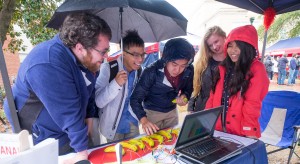
Engineering Librarian Bryan Young shows students how to use the banana piano in the Grove.
The University of Mississippi Libraries has purchased electronic kits – Raspberry Pis and Makey Makeys – with grant funds provided by the Institute of Museum and Library Services and the Mississippi Library Commission. The grant supports library initiatives that result in campus partnerships and outreach to external groups.
Raspberry Pis are low-cost computers about the size of a credit card originally designed for classroom use to help students learn programming and other computing principles. They can also interact with the outside world with the addition of sensors and other electrical components. Makey Makeys are electronic devices that computers interpret as keyboards. Using basic circuit principles, users can create interactive projects.
At home football games during the 2015 season, librarians tailgated in front of Carrier Hall and demonstrated Makey Makeys by creating a banana piano powered by one of the devices. Using Scratch, a free drag-and-drop software program, and a Makey Makey, people were able to play a piano with bananas instead of ivory keys.
Not only did participants have fun, many wanted to understand the science and engineering, including repeat visitors who would often explain to others.
Melissa Dennis, head of the library’s research and instruction services, helped secure the grant and brought her family to tailgating events.
“The banana piano works on so many levels for library outreach,” Dennis said. “My 7- and 11-year-old sons loved it and would attract other kids to stop and play, which led to their parents talking to the librarians. If a few people stopped, then others on the sidewalk would turn and watch.
“The piano created a great opportunity to remind everyone that our libraries provide more than just books!”
Academically speaking, the library is seeking partnerships with instructors and departments to integrate the electronic kits into their classes. Libraries from other schools have partnered with communications and music classes to integrate multimodal approaches into otherwise nontechnical courses.
At Ole Miss, students have used the kits to prototype ideas for a business entrepreneurship competition and provide an alternative to controlling presentation slides (by placing electro-conductive tape to a plastic toy gun trigger and programming the Makey Makey to communicate a space bar command to the computer). The School of Engineering has used them during outreach events at local schools.
The library hopes to continue to build partnerships and encourage students from both STEM and nonSTEM disciplines to use the electronic kits. Libraries have always fostered inquiry and aided in knowledge production. While the philosophical mission for libraries has not changed, electronic kits and other technology broadens the methods we use to fulfill that mission.